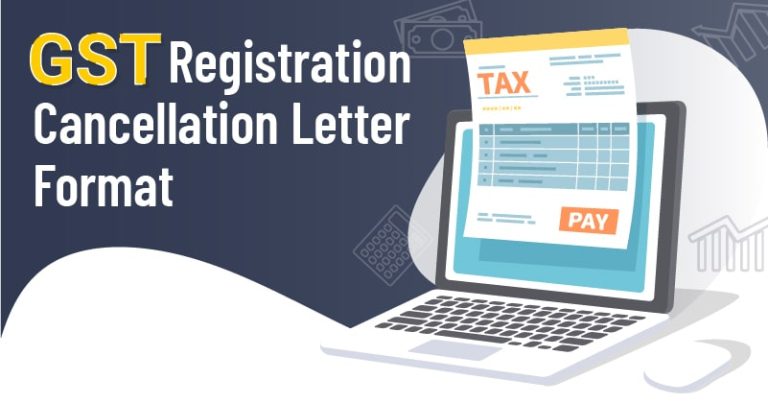Goods and Services Tax (GST) is a comprehensive indirect tax levied on the supply of goods and services in India. Under the GST regime, businesses are required to register themselves to comply with tax regulations. However, there might be instances where a registered taxpayer needs to cancel their GST registration due to various reasons. In this blog, we will explore the process of GST registration cancellation, including the letter format required for cancellation.
Understanding GST Registration Cancellation:
Before diving into the cancellation process, let’s understand when and why GST registration cancellation might be necessary. Businesses may need to cancel their GST registration in the following scenarios:
- Closure of Business: If a business ceases its operations or undergoes liquidation, GST registration cancellation becomes necessary.
- Change in Business Structure: In case of any change in the business structure, such as amalgamation, merger, or demerger, the GST registration of the entity may need to be cancelled.
- Threshold Limit: If a business’s turnover falls below the threshold limit for mandatory GST registration, the taxpayer can choose to cancel their registration.
- Transfer of Business: When a registered business is transferred to another entity, GST registration cancellation for the transferor entity might be required.
- Non-requirement of GST Registration: Certain businesses might have obtained GST registration erroneously or due to misunderstanding. In such cases, cancellation of GST registration is necessary.
Procedure for GST Registration Cancellation:
The process for GST registration cancellation involves the following steps:
- Visit the GST Portal: Log in to the GST Portal using your credentials.
- Access the Cancellation Form: Navigate to the Services tab and select “Application for Cancellation of Registration.”
- Fill the Form: Provide the required details in the cancellation form, including the reason for cancellation and the effective date of cancellation.
- Submit Documents: Upload the necessary documents supporting the cancellation request, such as closure documents, dissolution certificates, or any other relevant documents depending on the reason for cancellation.
- Verification: After submitting the form and documents, the application will be verified by the GST authorities.
- Confirmation: Once the verification process is complete, the GST authorities will issue an order for cancellation of registration.
- Acknowledgment: Upon successful cancellation, an acknowledgment of cancellation will be provided to the taxpayer.
GST Registration Cancellation Letter Format:
When applying for GST registration cancellation, it’s essential to submit a formal letter along with the cancellation application. Below is a sample GST registration cancellation letter format:
[Your Name]
[Your Address]
[City, State, PIN Code]
[Email Address]
[Contact Number]
[Date]
[Recipient Name]
[Designation]
[Department/Company Name]
[Address]
[City, State, PIN Code]
Subject: Request for Cancellation of GST Registration
Dear [Recipient Name],
I, [Your Name], proprietor/partner/director of [Business Name], having GSTIN [Your GSTIN], hereby request the cancellation of our GST registration with immediate effect. The details of our business are as follows:
- Business Name: [Your Business Name]
- GSTIN: [Your GSTIN]
- Address: [Your Business Address]
- Date of GST Registration: [Date of GST Registration]
The reason for this cancellation is [Provide Reason: Closure of Business/Change in Business Structure/Other]. We have enclosed all necessary documents supporting our request for cancellation.
We request you to process this cancellation at the earliest and provide us with an acknowledgment of cancellation.
Thank you for your attention to this matter.
Sincerely,
[Your Name]

1. Reasons for GST Registration Cancellation:
As mentioned earlier, there are various reasons why a business might opt for GST registration cancellation. Let’s explore these reasons in detail:
- Closure of Business: When a business ceases its operations permanently, either due to financial difficulties, restructuring, or any other reason, GST registration cancellation becomes necessary to avoid compliance obligations.
- Change in Business Structure: In cases of mergers, demergers, or any other structural changes within a business, the GST registration of the entity may need to be cancelled or transferred to the new entity.
- Threshold Limit: GST registration is mandatory for businesses whose turnover exceeds the prescribed threshold limit. However, if the turnover falls below the threshold limit, the taxpayer can choose to cancel their registration to avoid unnecessary compliance burdens.
- Transfer of Business: If a registered business is transferred to another entity, whether through sale, inheritance, or any other means, GST registration cancellation for the transferor entity might be required to avoid dual registrations.
- Non-requirement of GST Registration: Sometimes, businesses may have obtained GST registration erroneously or due to a misunderstanding of the registration requirements. In such cases, cancelling the GST registration is necessary to avoid unnecessary compliance and tax liabilities.
Understanding these reasons is crucial for businesses to determine whether GST registration cancellation is necessary in their particular circumstances.
2. Documents Required for GST Registration Cancellation:
When applying for GST registration cancellation, it’s essential to provide certain documents to support the cancellation request. The specific documents required may vary depending on the reason for cancellation. Some common documents include:
- Closure Documents: If the reason for cancellation is the closure of the business, documents such as closure certificates, dissolution certificates, or any other relevant documents proving the closure of the business entity may be required.
- Change in Business Structure Documents: In case of a change in business structure, documents such as merger or demerger agreements, partnership deeds, or any other relevant documents reflecting the change in structure may need to be submitted.
- Financial Statements: In certain cases, such as when the reason for cancellation is a fall in turnover below the threshold limit, financial statements demonstrating the reduced turnover may need to be provided.
- Identity and Address Proof: As with GST registration, identity and address proof of the taxpayer, as well as proof of authorized signatory, will also be required for cancellation.
Ensuring that all necessary documents are submitted accurately and in a timely manner is essential to expedite the cancellation process.
3. Impact of GST Registration Cancellation:
Cancellation of GST registration has several implications for businesses, including:
- Cessation of Tax Liability: Upon cancellation of GST registration, the taxpayer ceases to be liable to collect and remit GST on supplies made by them.
- Input Tax Credit (ITC): Businesses must reverse any remaining input tax credit claimed on their closing stock and capital goods. This adjustment needs to be made in the GST return for the tax period in which the cancellation becomes effective.
- Compliance Obligations: Once GST registration is cancelled, businesses are no longer required to file GST returns or comply with other GST-related obligations. However, they must ensure that all pending compliances are completed before cancellation.
Understanding the impact of GST registration cancellation is crucial for businesses to effectively manage their tax affairs and avoid any unintended consequences.
Conclusion:
In conclusion, GST registration cancellation is an important process that businesses may need to undertake under certain circumstances. By understanding the reasons for cancellation, the required documents, and the implications of cancellation, taxpayers can navigate the process smoothly and ensure compliance with GST regulations.
As GST laws and regulations are subject to change, it’s advisable for businesses to stay updated with the latest developments and seek professional guidance if needed to ensure compliance with GST requirements.
Also Read:
What is Goods and Service Tax (GST)?
How is GST different from the old tax system we had before?
A Simple Guide to Making a Board Resolution for GST Registration
Which Forms Do Need to Fill Out for GST Return?
Frequently Asked Questions
When is GST registration cancellation necessary?
GST registration cancellation becomes necessary when a business ceases its operations permanently, undergoes a change in business structure, falls below the threshold limit for mandatory registration, or in other specific circumstances outlined by the GST laws.
How can I cancel my GST registration?
GST registration cancellation can be initiated through the GST Portal by submitting an application for cancellation of registration along with the required documents.
What documents are required for GST registration cancellation?
The documents required for GST registration cancellation vary depending on the reason for cancellation but commonly include closure documents, change in business structure documents, financial statements, and identity/address proof.
Is there a specific form for GST registration cancellation?
Yes, taxpayers need to fill out Form GST REG-16, which is the application form for cancellation of registration, available on the GST Portal.
What is the procedure for cancellation of GST registration?
The procedure involves logging in to the GST Portal, filling out Form GST REG-16, uploading required documents, verification by GST authorities, and issuance of cancellation order.
Can I cancel my GST registration voluntarily?
Yes, taxpayers can voluntarily cancel their GST registration if they no longer meet the criteria for registration or if their business activities cease.
Is there a time frame for completing the GST registration cancellation process?
The GST registration cancellation process typically takes around 30 days from the date of submission of the cancellation application.
Do I need to file any final GST returns before cancelling my registration?
Yes, businesses are required to file any pending GST returns and clear any outstanding tax liabilities before applying for cancellation of registration.
What happens to my input tax credit (ITC) upon cancellation of GST registration?
Upon cancellation, taxpayers need to reverse any unutilized input tax credit claimed on closing stock and capital goods. This adjustment needs to be made in the GST return for the tax period in which the cancellation becomes effective.
Can I reapply for GST registration after cancellation?
Yes, businesses can reapply for GST registration if they meet the eligibility criteria for registration under the GST laws.




